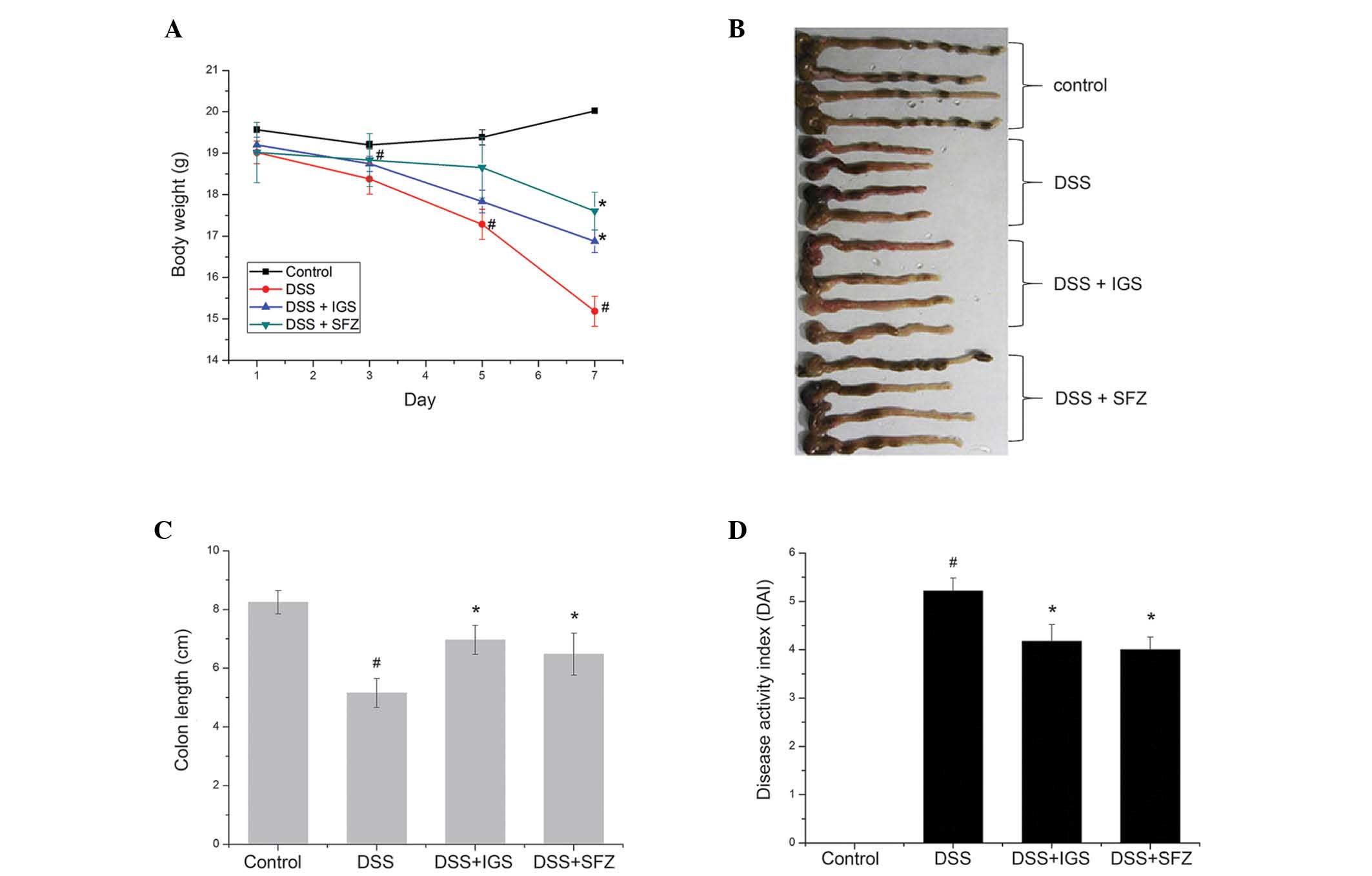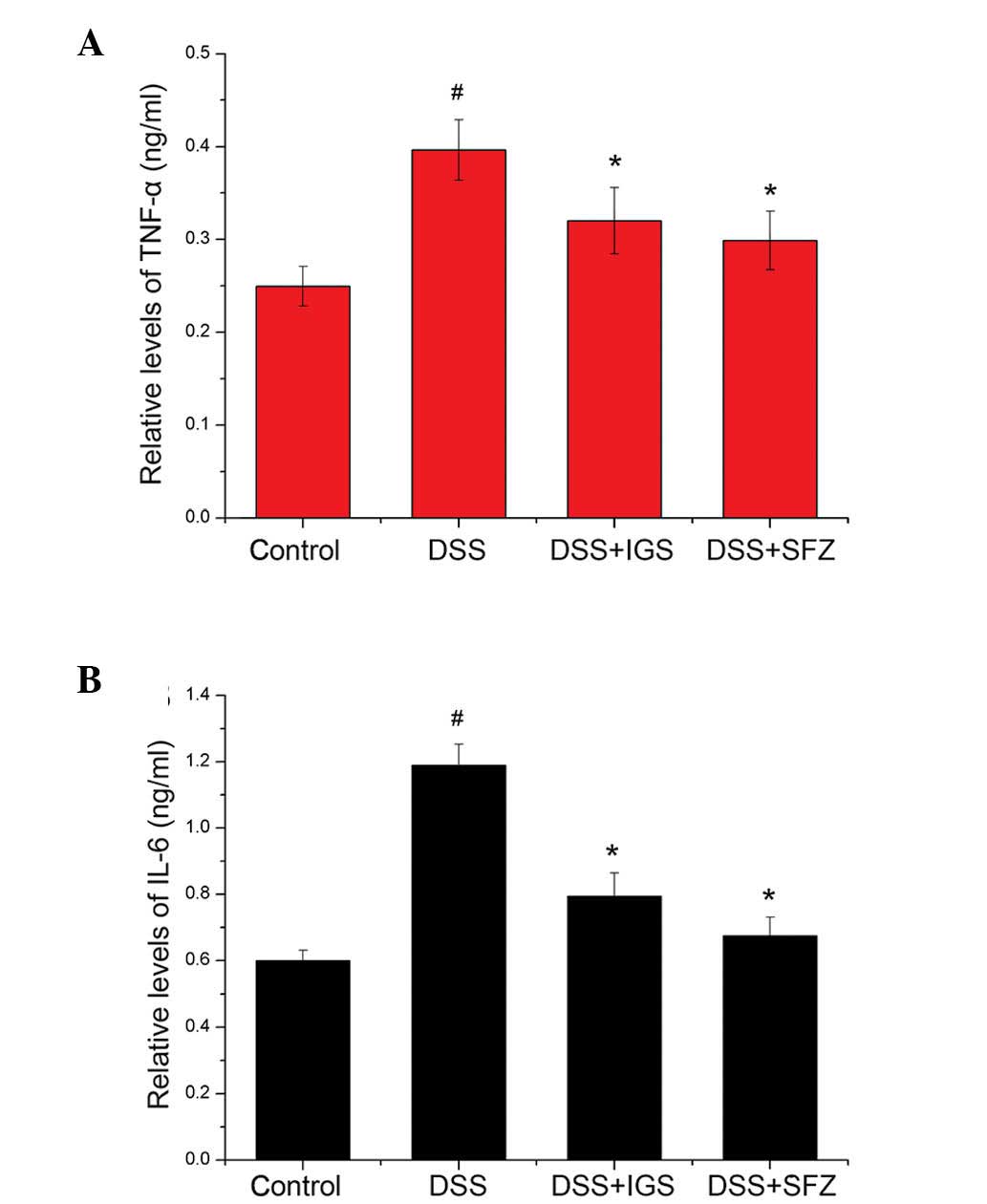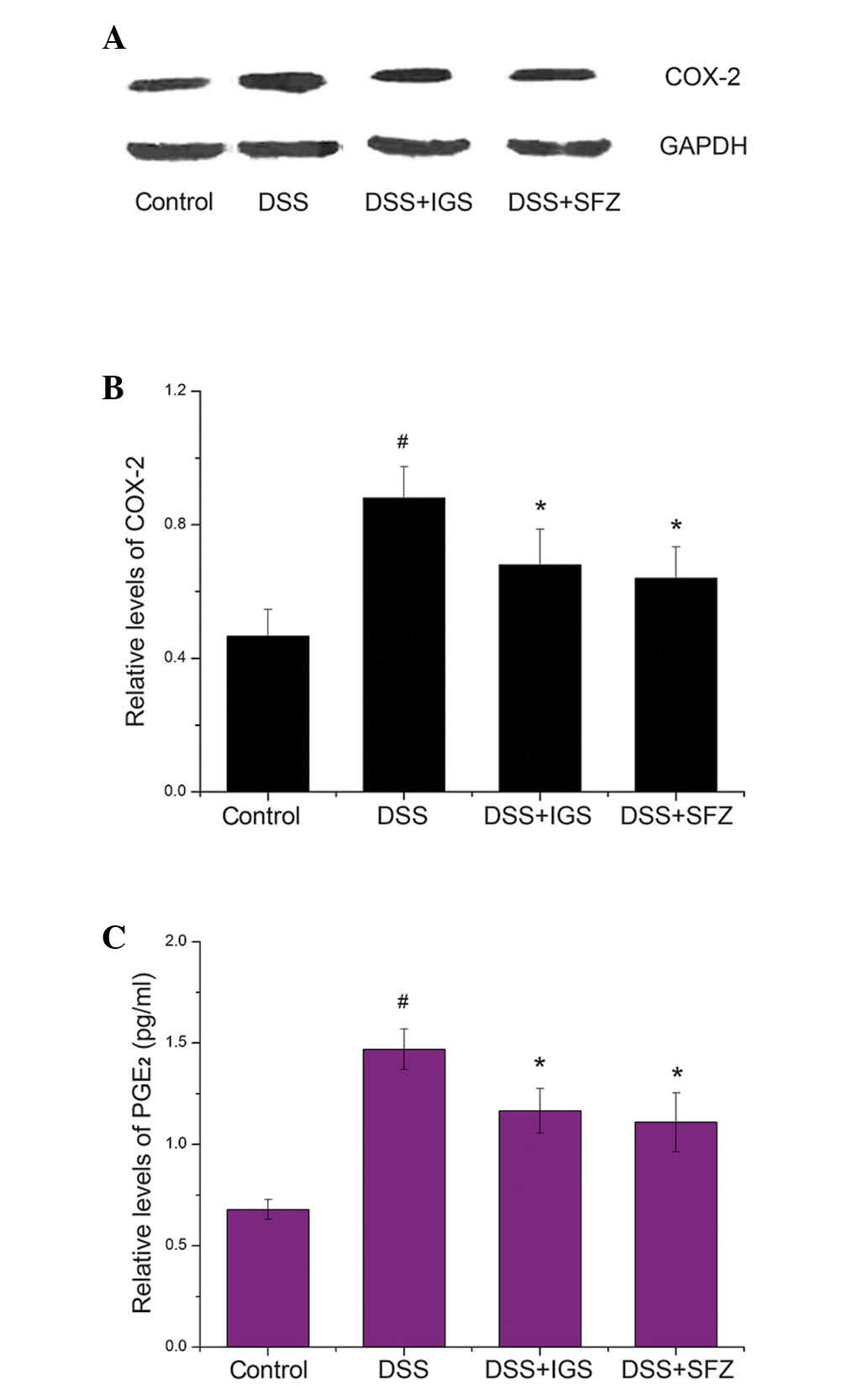|
1
|
Hyams JS: Inflammatory bowel disease.
Pediatr Rev. 21:291–295. 2000. View Article : Google Scholar : PubMed/NCBI
|
|
2
|
Danese S, Sans M and Fiocchi C:
Inflammatory bowel disease: The role of environmental factors.
Autoimmun Rev. 3:394–400. 2004. View Article : Google Scholar : PubMed/NCBI
|
|
3
|
Hendrickson BA, Gokhale R and Cho JH:
Clinical aspects and pathophysiology of inflammatory bowel disease.
Clin Microbiol Rev. 15:79–94. 2002. View Article : Google Scholar : PubMed/NCBI
|
|
4
|
Lichtenstein GR and Rutgeerts P:
Importance of mucosal healing in ulcerative colitis. Inflamm Bowel
Dis. 16:338–346. 2010. View Article : Google Scholar
|
|
5
|
Ullman T, Croog V, Harpaz N, Sachar D and
Itzkowitz S: Progression of flat low-grade dysplasia to advanced
neoplasia in patients with ulcerative colitis. Gastroenterology.
125:1311–1319. 2003. View Article : Google Scholar : PubMed/NCBI
|
|
6
|
Eaden JA, Abrams KR and Mayberry JF: The
risk of colorectal cancer in ulcerative colitis: A meta-analysis.
Gut. 48:526–535. 2001. View Article : Google Scholar : PubMed/NCBI
|
|
7
|
Domènech E: Inflammatory bowel disease:
Current therapeutic options. Digestion. 73(Suppl 1): 67–76. 2006.
View Article : Google Scholar : PubMed/NCBI
|
|
8
|
Buchman AL: Side effects of corticosteroid
therapy. J Clin Gastroenterol. 33:289–294. 2001. View Article : Google Scholar : PubMed/NCBI
|
|
9
|
Farrell RJ and Kelleher D: Glucocorticoid
resistance in inflammatory bowel disease. J Endocrinol.
178:339–346. 2003. View Article : Google Scholar : PubMed/NCBI
|
|
10
|
Li Y, de Haar C, Chen M, et al:
Disease-related expression of the IL6/STAT3/SOCS3 signalling
pathway in ulcerative colitis and ulcerative colitis-related
carcinogenesis. Gut. 59:227–235. 2010. View Article : Google Scholar
|
|
11
|
Papadakis KA and Targan SR: Role of
cytokines in the pathogenesis of inflammatory bowel disease. Annu
Rev Med. 51:289–298. 2000. View Article : Google Scholar : PubMed/NCBI
|
|
12
|
Ogata H and Hibi T: Cytokine and
anti-cytokine therapies for inflammatory bowel disease. Curr Pharm
Des. 9:1107–1113. 2003. View Article : Google Scholar : PubMed/NCBI
|
|
13
|
Mueller C: Tumour necrosis factor in mouse
models of chronic intestinal inflammation. Immunology. 105:1–8.
2002. View Article : Google Scholar : PubMed/NCBI
|
|
14
|
Vane JR, Bakhle YS and Botting RM:
Cyclooxygenases 1 and 2. Annu Rev Pharmacol Toxicol. 38:97–120.
1998. View Article : Google Scholar : PubMed/NCBI
|
|
15
|
Roberts PJ, Morgan K, Miller R, Hunter JO
and Middleton SJ: Neuronal COX-2 expression in human myenteric
plexus in active inflammatory bowel disease. Gut. 48:468–472. 2001.
View Article : Google Scholar : PubMed/NCBI
|
|
16
|
Agoff SN, Brentnall TA, Crispin DA, et al:
The role of cyclooxygenase 2 in ulcerative colitis-associated
neoplasia. Am J Pathol. 157:737–745. 2000. View Article : Google Scholar : PubMed/NCBI
|
|
17
|
Bantel H, Berg C, Vieth M, Stolte M, Kruis
W and Schulze-Osthoff K: Mesalazine inhibits activation of
transcription factor NF-kappaB in inflamed mucosa of patients with
ulcerative colitis. Am J Gastroenterol. 95:3452–3457. 2000.
|
|
18
|
Andresen L, Jørgensen VL, Perner A, Hansen
A, Eugen-Olsen J and Rask-Madsen J: Activation of nuclear factor
kappaB in colonic mucosa from patients with collagenous and
ulcerative colitis. Gut. 54:503–509. 2005. View Article : Google Scholar : PubMed/NCBI
|
|
19
|
Ma TY, Iwamoto GK, Hoa NT, et al:
TNF-alpha-induced increase in intestinal epithelial tight junction
permeability requires NF-kappa B activation. Am J Physiol
Gastrointest Liver Physiol. 286:G367–G376. 2004. View Article : Google Scholar : PubMed/NCBI
|
|
20
|
Atreya I, Atreya R and Neurath MF:
NF-kappaB in inflammatory bowel disease. J Intern Med. 263:591–596.
2008. View Article : Google Scholar : PubMed/NCBI
|
|
21
|
Jobin C and Sartor RB: The I kappa
B/NF-kappa B system: A key determinant of mucosalinflammation and
protection. Am J Physiol Cell Physiol. 278:C451–462.
2000.PubMed/NCBI
|
|
22
|
Kim SJ, Shin HJ, Lee BJ, et al: The
antiinflammatory mechanism of Igongsan in mouse peritoneal
macrophages via suppression of NF-κB/Caspase-1 activation.
Phytother Res. 28:736–744. 2014. View
Article : Google Scholar
|
|
23
|
Kim SJ, Kim YG, Kim DS, et al: Oldenlandia
diffusa ameliorates dextran sulphate sodium-induced colitis through
inhibition of NF-κB activation. Am J Chin Med. 39:957–969. 2011.
View Article : Google Scholar
|
|
24
|
Murthy SN, Cooper HS, Shim H, Shah RS,
Ibrahim SA and Sedergran DJ: Treatment of dextran sulfate
sodium-induced murine colitis by intracolonic cyclosporin. Dig Dis
Sci. 38:1722–1734. 1993. View Article : Google Scholar : PubMed/NCBI
|
|
25
|
Cooper HS, Murthy SN, Shah RS and
Sedergran DJ: Clinicopathologic study of dextran sulfate sodium
experimental murine colitis. Lab Invest. 69:238–249.
1993.PubMed/NCBI
|
|
26
|
Porter SN, Howarth GS and Butler RN: An
orally administered growth factor extract derived from bovine whey
suppresses breath ethane in colitic rats. Scand J Gastroenterol.
33:967–974. 1998. View Article : Google Scholar : PubMed/NCBI
|
|
27
|
Kim MS, Lim WK, Cha JG, et al: The
activation of PI 3-K and PKC zeta in PMA-induced differentiation of
HL-60 cells. Cancer Lett. 171:79–85. 2001. View Article : Google Scholar : PubMed/NCBI
|
|
28
|
Okayasu I, Hatakeyama S, Yamada M, Ohkusa
T, Inagaki Y and Nakaya R: A novel method in the induction of
reliable experimental acute and chronic ulcerative colitis in mice.
Gastroenterology. 98:694–702. 1990.PubMed/NCBI
|
|
29
|
Fiocchi C: Inflammatory bowel disease:
Evolutionary concepts in biology, epidemiology, mechanisms and
therapy. Curr Opin Gastroenterol. 29:347–349. 2013. View Article : Google Scholar : PubMed/NCBI
|
|
30
|
Ardizzone S and Bianchi Porro G: Biologic
therapy for inflammatory bowel disease. Drugs. 65:2253–2286. 2005.
View Article : Google Scholar : PubMed/NCBI
|
|
31
|
Rufo PA and Bousvaros A: Current therapy
of inflammatory bowel disease in children. Paediatr Drugs.
8:279–302. 2006. View Article : Google Scholar : PubMed/NCBI
|
|
32
|
Sato K, Ohkura S, Kitahara Y, et al:
Involvement of CPI-17 downregulation in the dysmotility of the
colon from dextran sodium sulphate-induced experimental colitis in
a mouse model. Neurogastroenterol Motil. 19:504–514. 2007.
View Article : Google Scholar : PubMed/NCBI
|
|
33
|
Sandborn WJ and Targan SR: Biologic
therapy of inflammatory bowel disease. Gastroenterology.
122:1592–1608. 2002. View Article : Google Scholar : PubMed/NCBI
|
|
34
|
Ishiguro K, Ando T, Maeda O, et al:
Paeonol attenuates TNBS-induced colitis by inhibiting NF-kappaB and
STAT1 transactivation. Toxicol Appl Pharmacol. 217:35–42. 2006.
View Article : Google Scholar : PubMed/NCBI
|
|
35
|
Kim SJ, Kim KW, Kim DS, et al: The
protective effect of Cassia obtusifolia on DSS-induced colitis. Am
J Chin Med. 39:565–577. 2011. View Article : Google Scholar : PubMed/NCBI
|
|
36
|
Raddatz D, Bockemühl M and Ramadori G:
Quantitative measurement of cytokine mRNA in inflammatory bowel
disease: Relation to clinical and endoscopic activity and outcome.
Eur J Gastroenterol Hepatol. 17:547–557. 2005. View Article : Google Scholar : PubMed/NCBI
|
|
37
|
Zheng P, Niu FL, Liu WZ, Shi Y and Lu LG:
Anti-inflammatory mechanism of oxymatrine in dextran sulfate
sodium-induced colitis of rats. World J Gastroenterol.
11:4912–4915. 2005.PubMed/NCBI
|
|
38
|
Beubler E, Schuligoi R, Chopra AK, Ribardo
DA and Peskar BA: Cholera toxin induces prostaglandin synthesis via
post-transcriptional activation of cyclooxygenase-2 in the rat
jejunum. J Pharmacol Exp Ther. 297:940–945. 2001.PubMed/NCBI
|
|
39
|
Tak PP and Firestein GS: NF-kappaB: A key
role in inflammatory diseases. J Clin Invest. 107:7–11. 2001.
View Article : Google Scholar : PubMed/NCBI
|
|
40
|
Bak YK, Lampe JW and Sung MK: Effects of
dietary supplementation of glucosamine sulfate on intestinal
inflammation in a mouse model of experimental colitis. J
Gastroenterol Hepatol. 29:957–963. 2014. View Article : Google Scholar
|
|
41
|
Song YA, Park YL, Kim KY, et al: Black tea
extract prevents lipo-polysaccharide-induced NF-κB signaling and
attenuates dextran sulfate sodium-induced experimental colitis. BMC
Complement Altern Med. 11:912011. View Article : Google Scholar
|
|
42
|
Joh EH, Lee IA, Jung IH and Kim DH:
Ginsenoside Rb1 and its metabolite compound K inhibit IRAK-1
activation - the key step of inflammation. Biochem Pharmacol.
82:278–286. 2011. View Article : Google Scholar : PubMed/NCBI
|
|
43
|
Yang XL, Guo TK, Wang YH, et al:
Ginsenoside Rd attenuates the inflammatory response via modulating
p38 and JNK signaling pathways in rats with TNBS-induced relapsing
colitis. Int Immunopharmacol. 12:408–414. 2012. View Article : Google Scholar : PubMed/NCBI
|
|
44
|
Lee IA, Hyam SR, Jang SE, Han MJ and Kim
DH: Ginsenoside Re ameliorates inflammation by inhibiting the
binding of lipopoly-saccharide to TLR4 on macrophages. J Agric Food
Chem. 60:9595–9602. 2012. View Article : Google Scholar : PubMed/NCBI
|
|
45
|
Xu L, Yang ZL, Li P and Zhou YQ:
Modulating effect of Hesperidin on experimental murine colitis
induced by dextran sulfate sodium. Phytomedicine. 16:989–995. 2009.
View Article : Google Scholar : PubMed/NCBI
|
|
46
|
Liu Y, Xiang J, Liu M, Wang S, Lee RJ and
Ding H: Protective effects of glycyrrhizic acid by rectal treatment
on a TNBS-induced rat colitis model. J Pharm Pharmacol. 63:439–446.
2011. View Article : Google Scholar : PubMed/NCBI
|
|
47
|
Kageyama-Yahara N, Wang P, Wang X, et al:
The inhibitory effect of ergosterol, a bioactive constituent of a
traditional Japanese herbal medicine saireito on the activity of
mucosal-type mast cells. Biol Pharm Bull. 33:142–145. 2010.
View Article : Google Scholar : PubMed/NCBI
|



















